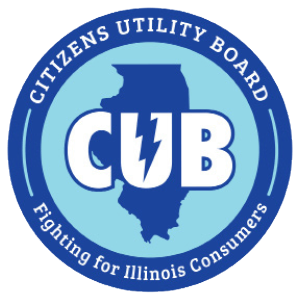Illinois utilities would be prohibited from charging customers potentially tens of millions of dollars for self-serving purposes to increase their political power and advance their agenda, including goodwill advertising, political-issue campaigns and bankrolling high-priced legal teams working to win rate hikes against consumers, under legislation supported by the Citizens Utility Board (CUB) and AARP Illinois. (See the full version of the release here.)
The “Utility Affordability Act” (Senate Bill 2885/House Bill 5061), sponsored by State Senator Suzy Glowiak Hilton (Western Springs) and State Representative Theresa Mah (Chicago), is the latest reform measure in the country designed to bar utilities from burdening customers with such spending that should instead be covered by the companies’ shareholders. Three other states have passed similar reform legislation over the past year—including Connecticut, Colorado and Maine.
CUB estimates the Illinois legislation could, for the average year, save ratepayers across Illinois more than $50 million, based on documents the utilities filed with their most recent rate cases.
“Ratepayers need a break and this bill would give them one,” said State Representative Mah. “I am proud to sponsor a bill that will hold utilities accountable and result in lower rates.”
“This is part of Illinois’ continued effort to protect rate-paying customers from egregious utility rates,” said State Senator Glowiak Hilton. “We must protect people’s wallets and prevent utility customers from footing the bill for these charges.”
Current Illinois law allows utilities to recover certain expenses from their customers that consumer advocates have long argued should be paid for by shareholders. Under the Utility Affordability Act, investor-owned electric, gas and water utilities in Illinois would be prohibited from charging customers for the following expenses:
- Utility dues for memberships in trade associations that push the companies’ agenda.
- Work devoted to political issues campaigns, such as referendums.
- Goodwill advertising that enhances the utility image and benefits shareholders.
- Charitable donations made by utilities on behalf of ratepayers.
- Insurance protection for shareholders.
- Lawyer and expert witness costs when utilities push for rate hikes before the Illinois Commerce Commission (ICC). Typically, such legal expenses take up the largest chunk of these recoverable costs.
In addition, the legislation would require the ICC to hold at least one local public hearing on utility rate-hike requests. It would also prohibit utilities from using rate-payer money to fund the newly created Intervenor Compensation Fund (ICF), which is a pot of money devoted to helping nonprofit groups challenge rate hikes.
Supporters say the Utility Affordability Act does not prevent utilities from spending money on these items–it only prohibits the companies from charging customers for them. Holding utilities more accountable for their spending and helping to reduce utility bills is vital, as Illinois consumers have faced a barrage of $3 billion in rate-hike requests over the past year—including two new water requests in 2024 ($152 million for Illinois American Water and $19.2 million for Aqua Illinois).
“The Utility Affordability Act will stop electric, gas and water utilities from charging us for a long list of expenses they rack up trying to raise our rates and further increase their political power,” said CUB Director of Governmental Affairs Bryan McDaniel. “Shareholders should bear those costs, not ratepayers.”
“The Utility Affordability Bill would empower ratepayers, enhance transparency, and reinforce accountability from utility companies. It represents a significant stride towards a more equitable energy landscape for not only AARP members but all Illinoisans,” said AARP Illinois State Director Philippe Largent.
“This legislation is common sense to anyone who pays a utility bill: Why should customers be forced to foot the bill for their utilities’ political influence and anti-consumer agendas?” said Matt Kasper, Deputy Director of the Energy and Policy Institute, a watchdog that works to counter misinformation by utility interests. “The Utility Affordability Act will put a stop to this practice and instead require utilities to use their own profits for these advocacy activities.”
CUB encouraged Illinois consumers to visit CUBActionCenter.com to send a message to their legislators in favor of the Utility Affordability Act.



